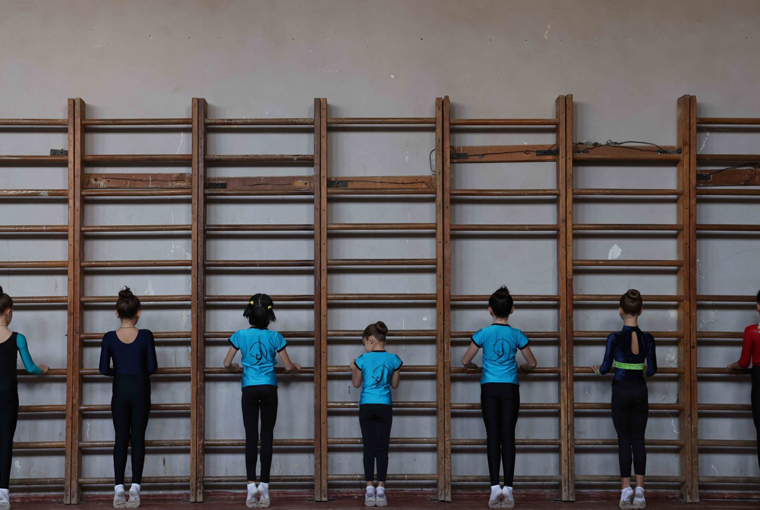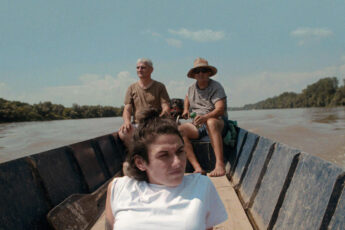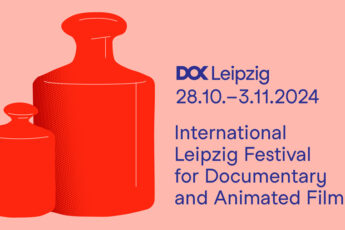Child Abuse or Personal Achievement?
Maka Gogaladze’s Ever Since I Knew Myself (Rats tavi makhsovs, 2024)
Vol. 145 (May 2024) by Lucian Tion
Portraits of famous historical figures on crumbling walls; hymns to a magnificent land; massive statues looming over city dwellers, reminding them of the splendor of their country… All of this serves as the background for Maka Gogaladze’s documentary set in Georgia, a nation that in a few years after 1991 went from Soviet republic to keen contender for membership in the European Union. The subject of Ever Since I Knew Myself is the director’s relationship with this country, but also with her mother. Along with asking largely unanswered (and unanswerable) questions about childrearing practices in a fossilized system described as the antonym of Western education, the documentary performs a much-needed assessment of Georgian teaching methods and content at a time when the practices of the past are bound to collide with the principles of liberal modernity.
Not unlike the despondent youngsters she follows in her documentary, Maka claims to have suffered maltreatment as a child because her mother made her take piano lessons, which she detested. In her defense, the mother claims that these were intended to prepare her for the trials of life and to teach her that personal success comes at a price. Even though Maka has no intention of making her mother feel guilty about poor childrearing some thirty years post factum, the mother, who is now in her sixties, becomes the object of Maka’s sugarcoated accusations of abuse, which serve as the central focus of the film’s otherwise quite slim narrative.
Although mostly about the relationship between mother and daughter, the film is at heart a strong condemnation of an educational system that has been frozen in a state of arrested development. The B-roll footage that illustrates the mother-daughter conflict consists of scenes from the performing arts school that we presume Maka attended as a child. Although rather randomly chosen, these scenes astound us from the moment the film begins: While a strict female instructor pushes a young girl to “play like a man” during piano lessons, another forces her young female students to do leg stretches that appear almost unnatural – and not in an aesthetically pleasing way. Additionally, all of the students – who are barely teenagers – are subjected to mind-numbing, nationalist, and traditionalist propaganda that verges on intellectual torture, while typifying gender roles to a degree that Western viewers will find almost mind-boggling.
This educational style is, of course, recognizable all over postsocialist, postcolonial Eastern Europe. And so are the lyrics of national anthems, it seems. Verses such as “our country is a bundle of arrows, impossible to break” and “I must stay on duty here in my Georgia” figure prominently in the songs that otherwise experienced and competent teachers push down the throats of young, unassuming students in Gogaladze’s film, effectively making us wonder whether the director shot this documentary in our day and age, or in some isolated country sometime in the middle of the 19th century. Although unthinkable in the multicultural West today, lines in anthems from Poland to Mongolia still urge their citizens to kill their neighbors – who are incontrovertibly enemies – and take up arms against anyone who dares to touch the holy soil of their motherland.
While the narratological and cinematographic discourse honestly attempts to address the question “How on earth did we get here?”, its imagery is a bit trite. Too many shots of nature (trees shuffling in the wind are a director’s favorite) serve merely as a background for the conversation between the director and her mother, oftentimes conveyed in voice-over. Moments in which she could have focused on character development feel wasted on banal picturesque landscapes that add little to make us empathize with either Maka or her mother. Even though the coldness the film exudes via shots of falling snow and gray cityscapes shot from a bird’s eye view seem to indicate that the director probably worked against such identification between the audience and either of her main characters, empathy would have achieved more than the film’s lackadaisical form currently does. In its absence, we perceive the passage of time and register the successive scenes as monotonous rather than poignant. Furthermore, static shots, somewhat unimaginatively underscoring the country’s falling behind modernity, feel slightly lengthy. (Although funny to a Western eye, the shot of two farmers peeling the skin off a lamb hanging from a tree on the side of a highway feels unnaturally long). In conclusion, Gogaladze’s assertion that her nation appears to have entered a time loop that permits nationalism to endure unabated into the twenty-first century seems a little clichéd, particularly in the second part of the movie. Having watched the film, we understand the director’s love-hate relationship with her native land from the very first scenes. The trouble with that is, until the last scenes, nothing changes.
While the cinematography does not awe the spectator, the director deserves kudos for refraining from employing a rather abused stereotype. Many postsocialist Eastern European directors the same age as Gogaladze have recently made it a habit to blame all the horrors of their liberal capitalist present on Communism alone. Gogaladze helps debunk this myth, clearly pointing the finger to imperialism rather than socialism, suggesting that the abusive features of the state come from a nationalist rather than socialist ideology. In the former territory of today’s Georgia, that is, in what used to be colonized regions of the Russian Empire, nationalism emerged as a reaction to the absolutism of the Tsar long before Communism took hold of the region in the 20th century.
This explains why Georgian intellectuals, many of whom appear in Gogaladze’s film as pedagogues, are fixated with 19th-century literary figures, like the modern poet Vazha, who continue to dominate the country’s literary landscape. It’s therefore not accidental that one of these intellectuals, and a teacher at the performing arts school where Maka shoots her film, discusses Alain Delon’s usage of Vazha to treat his depression in a scene that is full of the director’s healthy irony: “Who is this man?” the French actor reportedly inquired after reading Vazha’s poetry, “take me to Georgia!” The teacher argues that Vazha’s worthiness as a poet is demonstrated by the fact that someone with an entirely different cultural background, such as the French actor, was able to understand him. Based on this reasoning, in what amounts to the epitome of self-Orientalism, the teacher strongly believes that Vazha is today regarded as one of the top three writers in the world.
There is a reconciliation of sorts between mother and daughter in the film’s finale. With tears in her eyes, the mother confesses that she wishes she could have given her kids more hugs and kisses, and intimates that she would have done things differently at 60. She gave them tough love, she continues, because anything else, she thought as a young mother, would have spoiled a child. And this is where the film’s ambivalence comes through to good effect: How should we educate our children in the modern world, given that the Western educational system, with its low achievement rates, must have served as a point of contrast with the archaic but solid training of Georgian students? Is this country, situated on the physical and metaphorical periphery of Europe, so misguided in its intention to preserve a traditional way of life which the West has most definitely lost? How could we explain why, after centuries of imperialism and socialism, the rigorous educational methods used in Eastern Europe and the Soviet Union led to improved performance in arithmetic, gymnastics, and culture, among other things?
Had it not been for this strict system, would Nadia Comăneci still have scored a perfect 10 at the Montreal Olympics of 1976? Would we still have a Karpov and a Kasparov? Or do we not need such role models anymore? Here, the widely held belief that one must face adversity in order to achieve greatness is severely tested. What is the way forward? Is rigorous education inherently harmful? Against her better judgement, Maka’s mother continues to believe that her childrearing worked. But does it leave a child permanently scarred, or does it set her up for success? Or is there a third, alternative way?
Aside from pointing out a real-existing generation gap between old and young Georgians (a conflict to which all Eastern Europeans can relate), Gogaladze’s film opens up an interesting line of questioning on what it means to remain true to oneself, that is, to preserve one’s national cultural heritage in today’s multicultural world, without, that is, turning into a rabid nationalist like most of her characters. Moreover, while undeniably condemning the devious power of conservatism and nationalism, the film equally – yet unassumingly – throws sideway glances at the power of capitalism, doubting to a degree that liberalism should be allowed to shape today’s postcolonial world. In that sense, the film captures what it means to be living in contradiction, or to live at the crossroads of modernity and the past.
Ironically, the same teacher who extolled the worthiness of Vazha’s poetry alleges that Georgians can only raise their children as sheep or wolves, as if no middle ground ever occurred to him as a possibility. We are, after all, in an ‘eat or be eaten’ cultural mindset, and this mentality, undergirded by Gogaladze’s mother later in the film, can only be described as black-and-white thinking. But which parent in the still developing country would rather see their children be put down than do well in an inclement world? If change is to come to the East, who among us is willing to jeopardize their personal safety and abandon their accustomed habits of thinking in the name of progress?
While clearly depicting a state of mind indebted to old behavioral patterns that make very much sense to a population that has been occluded by grinding economic development, the film ultimately asks the unuttered question, “Would Georgia have been better off in Europe?” Therefore, should the country, like other Eastern European neighbors that scored doubtful achievements with capitalism, have adopted unrestrained liberalism? It is this meta-textual aspect of Gogaladze’s film, its depiction of a world full of contradictions, that appears more interesting than the prosaic conflict between generations, notwithstanding the protagonists’ heartfelt pain, which gets through to us only with difficulty.
Resembling the rest of the postcolonial world, rather than the West it hopes to join, Georgia comes across, in this rather cold and distant documentary, as a country that has a long way to go to fulfill its political aspirations. Although it bears the earmarks of too many project development workshops that negatively impact personal style, the film’s preoccupation with education in the postcolonial, postsocialist world has all the signs of laying the basis for an interesting discourse in future endeavors focused on the much-needed aspect of education in this confused, conflicted, and complicated cultural environment.




Leave a Comment